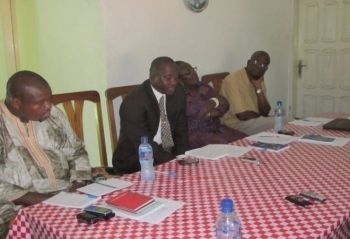Retreat

CRC members along with Cllr. Jallah Barbu of the Law Reform Commission
Photo Credit: CRC |
CRC ROBERTSPORT RETREAT
The Constitution Review Committee (CRC) on February 13-15, 2013 held a three day working retreat in Robertsport aimed at reviewing its mandate, strategizing approach methods, sharing views on constitutional provisions and other national documents associated with the constitution review process such as the National Policy on Decentralization, Agenda for Transformation, Road Map to Peace and Reconciliation, and the 1986 Constitution.
The Historic City of Robertsport located on hilly topographic terrain with its tourist attractive beaches and the beautiful Lake Piso provided the proper atmosphere and serenity for interactions. The Chairperson of the CRC, Cllr. Gloria M. Musu Scott said the purpose of the retreat was to have shared knowledge so that Committee Members would have understanding of the constitution and critical matters of governance that may be raised during nationwide consultations in other to speak with one voice on issues regarding the process since at one point or the other, they might be separated. She further elaborated on the process saying the Committees’ mandate is based on a participatory platform that would ensure appropriate decision making mechanisms that would lead to comprehensive recommendations to the President for legislative action.
The retreat took a retrospective look at the 1847 constitution and the 1986 constitution and did comparative analysis of events and conditions which led to their making. An overview of both constitutions was done with focus on provisions contained in the current constitution. The overview chaired by Cllr. Willie Barclay of the Law Reform Commission critically analyzed the Preamble and 97 articles of the 1986 Constitution with inputs from participants who took note of troubling, contentious and ambiguous provisions. It was a whole day affairs. This section which was the first gave insight into the 1986 constitution and justifications for a review.
On day two, the Governance Commission represented by Cllr. Yarsuo Weh-Dorliae, Commissioner Elizabeth Sele Mulbah and GC Secretariat made a presentation on processes that would lead the nation to decentralization. The GC package contained recommendations for the election of superintendents, district commissioners, and county councils that would serve as local legislative bodies.
The recommendations which have constitutional ramifications were discussed, debated, and a broader understanding as to the way forward was achieved. Specifically, the GC recommends amendment of articles 54 and 56 of the 1986 Constitution. These are expected to be issues that might be discussed by citizens of Liberia during nationwide consultations. Commissioner Elizabeth Sele Mulbah also made a presentation on the 2030 National Vision Document which also has constitutional related recommendations and the need for the CRC to have a comprehensive understanding.
The Deputy Minister of Internal Affairs Tiah Nagbe and Cllr. Dorliae told participants that some aspects of the decentralization policy need to be actualized as soon as possible since they would concentrate powers in the hands of the people. In their opinion, the amendment of the constitution to provide for the election of superintendents by 2017 is important.
The Committee took note of the suggestion but drew attention to processes for impeachment, candidacy, and functions which also are key factors. House of Representative Statutory Committee on Judiciary Chairman Cllr. S. Gayah Karmo was invited by the CRC as a lawyer and Member of the House of Representatives to speak on procedures, processes, and strategies to obtain approval from the Legislature for constitutional amendments. The notable lawmaker cited articles 91 and 92 of the 1986 Constitution as the guide to constitutional amendments. However, he advised the CRC to take note of legislative agenda, calendar, and what he described as the super two-third majority. He further informed participants that the Legislature has an obligation to go back to their constituents for consultation and their constitutional responsibility of conducting public hearing. He cautioned that amendments must be based on popular initiatives of the people and not political actions and initiatives which by-pass normal legislative processes.
The retreat brought together dignitaries such as His Excellency, Aeneas Chuma, Deputy Representative of the UN Secretary General in charge of the Consolidation of Democratic Governance and his entourage. In his remarks, the DRSG said constitution is meant to last the test of time and education is required in the process. He advised that the people must see themselves in the constitution through inclusivity which brings about stability and adherence. He said the process is to build a new state and a kind of cohesiveness. He pledged UNMIL continue support to the CRC and assistance to access international goodwill. He commended the success of the retreat. For her part, Cllr. Gloria Musu Scott, Chairperson of the CRC thanked all presenters and participants for the frank and exhaustive exchange of views under a democratic atmosphere. She emphasized the need for cordial engagements with all stakeholders and the National Legislature for the success of the process.
Other dignitaries who graced the Retreat were UNDP Representative Dominic Sam and Cllr. Jallah Barbu, Chairman of the Law Reform Commission. Committee Members present were: Cllr. Gloria Scott, Honorable Soko Sackor, Rev. Kennedy Sandy, Rev. Dr. Jasper S. Ndaborlor, and Dr. Elwood Dunn.